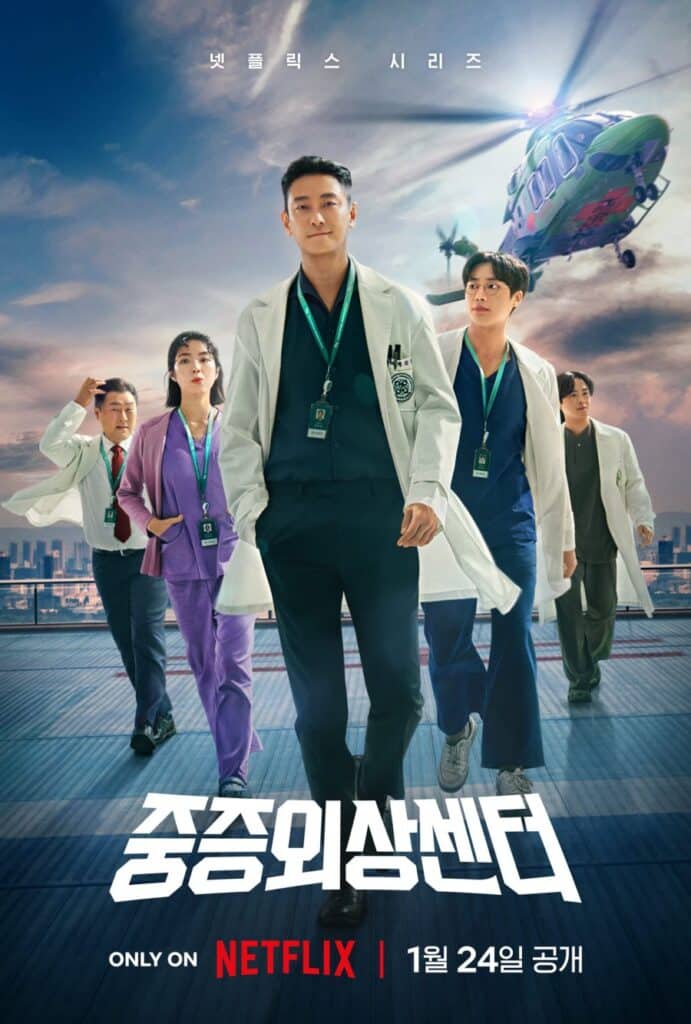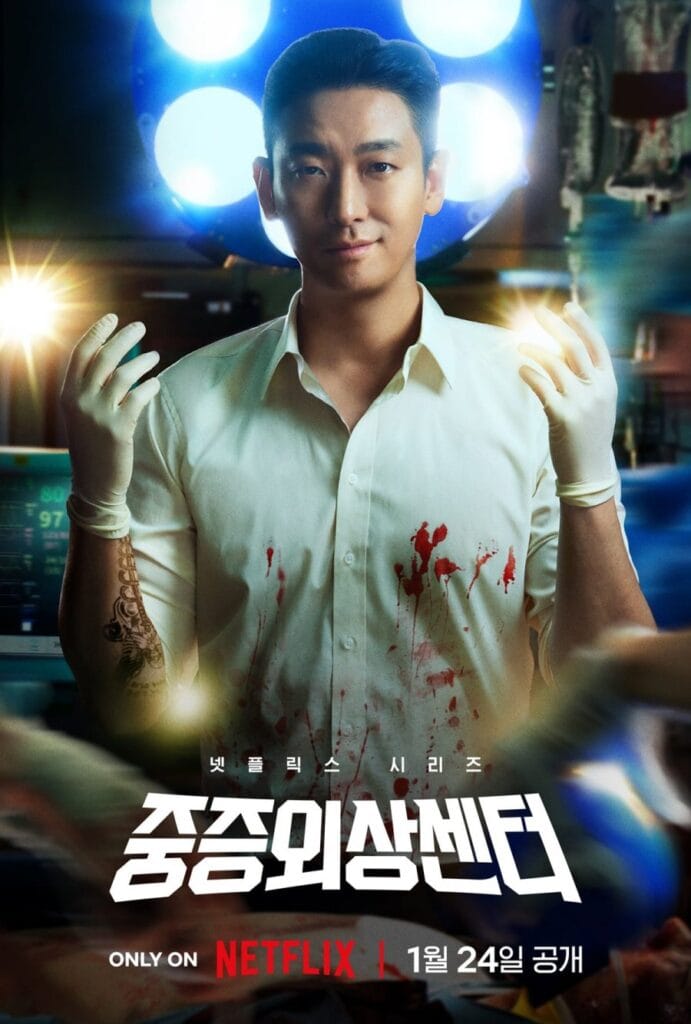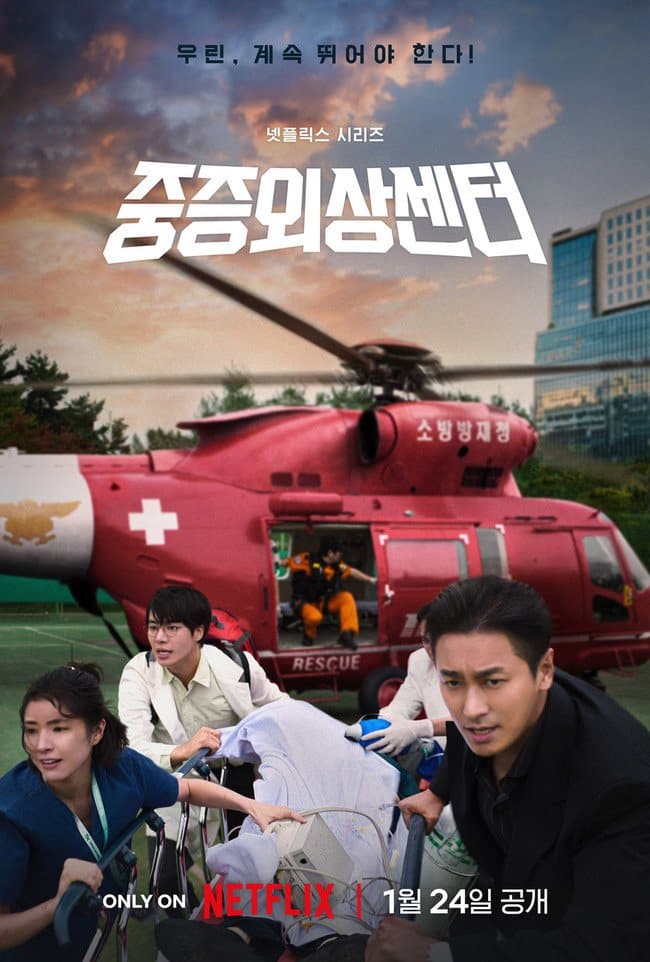REVIEW: “The Trauma Code”—Netflix’s Hidden Gem You Need to Watch Now
Drama: The Trauma Code: Heroes on Call
Native Title: 중증외상센터 (Jungjeung Oesang Senteo)
Also Known As: Severe Trauma Center: Golden Hour
Director: Lee Do-yoon
Screenwriter: Choi Tae-kang
Release: 2025
Episodes: 8
Original Network: Netflix
Genre: medical, drama, comedy, action
Tags: hospital, surgeon, teamwork, co-workers, adapted from a web novel
Where to watch:

Cast
Main Role

Ju Ji-hoon as Baek Gang-hyeok

Choo Young-woo as Yang Jae-won

Ha Young as Cheon Jang-mi

Jeong Jae-kwang as Park Gyeong-won

Yoon Gyung-ho as Han Yu-rim
Support Role
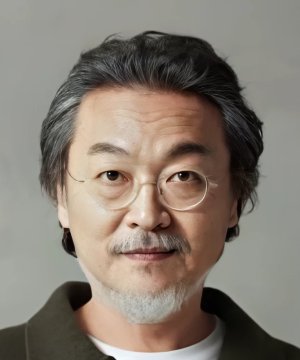



A Fast-Paced Medical Drama That Cuts Deep and Hits Hard
Netflix’s first original Korean medical drama, The Trauma Code: Heroes on Call, delivers a gripping, fast-paced look into the world of trauma care—where heroism isn’t measured in glory, but in seconds saved. Based on the popular web novel Trauma Center: Golden Hour by Hansanleega, the eight-episode series blends adrenaline-fueled emergencies, ethical confrontations, and character-driven storytelling into a raw and unforgettable drama.
👋 Hey K-Drama Lovers,

If you’ve been craving a medical K-drama that skips the fluff and gets straight to the grit—this one’s for you. The Trauma Code: Heroes on Call isn’t your typical white-coat drama. There are no coffee shop meet-cutes or slow-burn romances here. Instead, it dives headfirst into battlefield chaos, moral ambiguity, and frontline urgency that feels more ER than Hospital Playlist, more House than Dr. Romantic.
This 2025 release throws you into a world of high-stakes emergency medicine, institutional failure, and relentless pressure—where every second matters and every decision can cost a life. I finally gave in to the hype, and I’m glad I did. With cinematic visuals, powerhouse performances, and emotionally grounded storytelling, The Trauma Code doesn’t just ask what it means to save a life—it asks what it costs.
Here’s why it deserves a spot on your watchlist—and maybe even your heart.
🔍 Plot and Premise: What’s The Trauma Code All About?

Dr. Baek Kang-hyuk (Ju Ji-hoon), a world-class trauma surgeon hardened by years in war zones, returns to Seoul with one mission: to revive the failing trauma center at Hankuk National University Hospital. Nicknamed “Malak” (“The Hand of God”) for his surgical brilliance under fire, Baek brings unorthodox methods, unflinching ethics, and zero patience for bureaucracy.
He quickly assembles a trauma team: earnest rookie Dr. Yang Jae-won (Choo Young-woo), witty and grounded Nurse Cheon Jang-mi (Ha Young), and reluctant anesthesiologist Park Kyung-won (Jung Jae-kwang). Together, they transform a neglected corner of the hospital into a frontline emergency unit —where every second counts, and every decision can mean the difference between life and death. But with every patient saved, the hospital’s financial burden grows, exposing a brutal truth: in this system, compassion comes at a cost.
Each episode plunges viewers into high-pressure trauma cases and complex ethical dilemmas, with Baek and his team fighting not only for their patients—but against a healthcare system riddled with red tape, politics, and profit-driven agendas. It’s a searing, high-stakes exploration of moral courage, institutional failure, and the emotional toll of saving lives when the system itself is on life support.
🎭 Cast & Performance: A Team Worth Saving
At the heart of The Trauma Code: Heroes on Call is an ensemble cast that breathes life, grit, and complexity into every scene.
⭐ Ju Ji-hoon as Dr. Baek Kang-hyuk
In perhaps one of the most intense performances of his career, Ju Ji-hoon embodies Baek with a fiery, unstoppable force. His portrayal evokes echoes of House, but with a Korean spin—less morally gray, more action-hero. Confident to the point of arrogance, Baek is a walking paradox—hyper-competent yet emotionally guarded, a rule-breaker with a rigid moral compass. Every glance and surgical movement carries weight, portraying a man who has seen too much and still refuses to look away.
“He doesn’t ask if you’ll survive. He decides it.” — a fellow doctor
“When the hospital chooses profit over people, patients don’t die by accident—they die by design.”
— Dr. Baek during a press conference
“Every second counts. I’m not going to wait for your protocol to catch up with my instincts.”
— Dr. Baek Kang-hyuk


⭐ Choo Young-woo as Dr. Yang Jae-won
Jae-won is the emotional heart of the show. Starting as a hesitant resident from the proctology department, he transforms into a competent trauma surgeon through Baek’s mentorship. Choo’s portrayal is sincere and relatable, giving the audience someone to root for as he evolves from rookie to hero. Choo brings depth, vulnerability, and eventual confidence to the role—earning both Baek’s respect and ours.
Why did you choose me of all people?
— Dr. Baek to Dr. Yang Jae-won
It’s simple. You’re a good runner. Every time I saw you, you were running. Running to save a patient.
⭐ Ha Young as Nurse Cheon Jang-mi

Jang-mi grounds the team with her wit, warmth, and unwavering professionalism. Initially skeptical of Baek’s chaotic leadership, she evolves into his most trusted ally—serving as both the emotional anchor and moral compass of the trauma unit. Ha Young nails the delicate balance of being tough when needed and comforting when it matters. Her presence brings levity, heart, and grounded strength, and her chemistry with both Baek and Jae-won adds emotional depth to an otherwise adrenaline-charged environment.
In trauma, you need speed, skill, and someone to clean up your mess. That’s me.”
⭐ Jung Jae-kwang as Park Kyung-won
The trauma center’s cautious anesthesiologist quietly embodies the tension between caution and crisis. While his character isn’t as deeply explored in Season 1, Jung Jae-kwang brings subtle nuance to every scene, offering a steady, risk-aware foil to Baek’s bold, often reckless decisions. His calm presence adds understated tension and highlights the necessary balance between safety and urgency in trauma care.

⭐ Strong Supporting Cast
The supporting cast is stacked with talent and helps build a hospital ecosystem that feels authentic—full of clashing egos, institutional resistance, and reluctant allies.
Yoon Kyung-ho stands out as rival Dr. Han Yoo-rim, whose animosity toward Baek gradually softens after a deeply personal turning point involving his daughter. Kim Eui-sung as Director Choi and Kim Won-hae as Director Hong add weight and tension to the hospital’s political landscape. Together, these characters offer a compelling and grounded backdrop to the central trauma team’s journey.
🧠 Themes & Tone: Ethics Under Fire
At its core, The Trauma Code: Heroes on Call is about more than just saving lives—it’s about the cost of saving them within a broken system. Unafraid to get its hands dirty, the series dives deep into the moral gray zones of trauma care, where urgency collides with red tape and ethics are tested at every turn.
🔑 Key Themes:
- Life vs. Budget: Every surgery and rescue pushes the hospital deeper into financial strain. The trauma center’s growing success becomes a liability, exposing the cruel irony of a healthcare system where compassion is expensive and efficiency is judged by profit.
- Systemic Failures: From underfunding and media scrutiny to political sabotage and interdepartmental rivalry, The Trauma Code presents a biting yet grounded critique of institutional dysfunction—where sometimes, the system itself is the deadliest threat.
- Ethics vs. Bureaucracy: Dr. Baek’s bulldozer approach—cutting through hierarchy, ignoring protocol, and saving lives at any cost—puts him in direct conflict with a slow, politically driven administration. The show boldly asks: when seconds matter, do the rules still protect patients?
- Mentorship & Growth: One of the series’ most emotionally satisfying arcs is Jae-won’s transformation under Baek’s harsh yet honest mentorship. It’s a powerful reminder that heroism isn’t born—it’s forged through fire, failure, and resilience.
- Trauma—Physical and Emotional: The series doesn’t just show wounds—it reveals the scars left behind. Doctors carry invisible burdens: grief, guilt, and exhaustion that humanize them without tipping into melodrama.
🎭 Tone & Style: Realism Over Romance
This is not your soft-lit, romance-laced hospital drama. The Trauma Code trades warm fuzziness for grit, gallows humor, and relentless urgency. One of its boldest creative decisions is the absence of romance. Instead, it focuses squarely on professional dedication, emotional endurance, and systemic critique.
Still, moments of levity are earned—through Baek’s dry wit, Jang-mi’s sass, or the team’s occasional missteps. These moments ground the show emotionally, making the chaos feel all the more human.
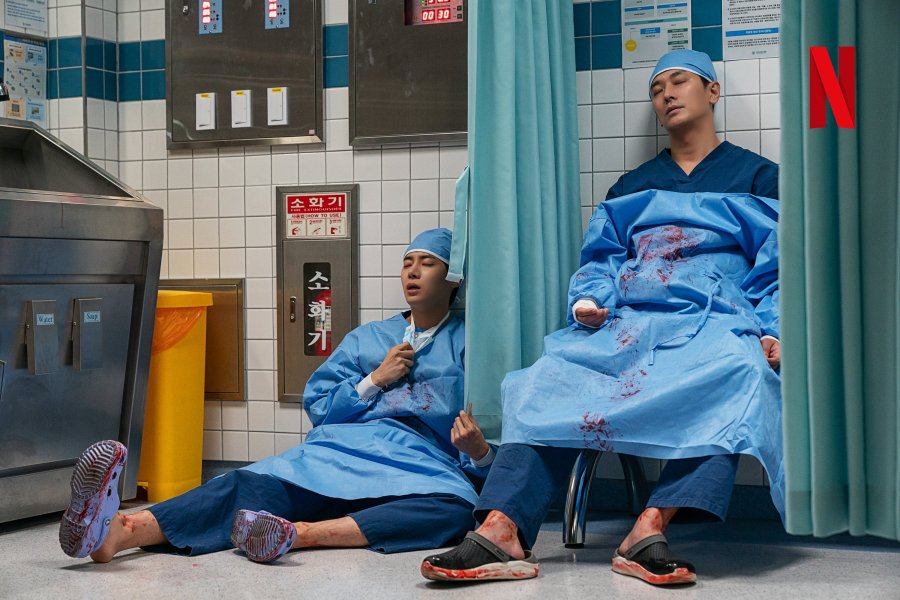
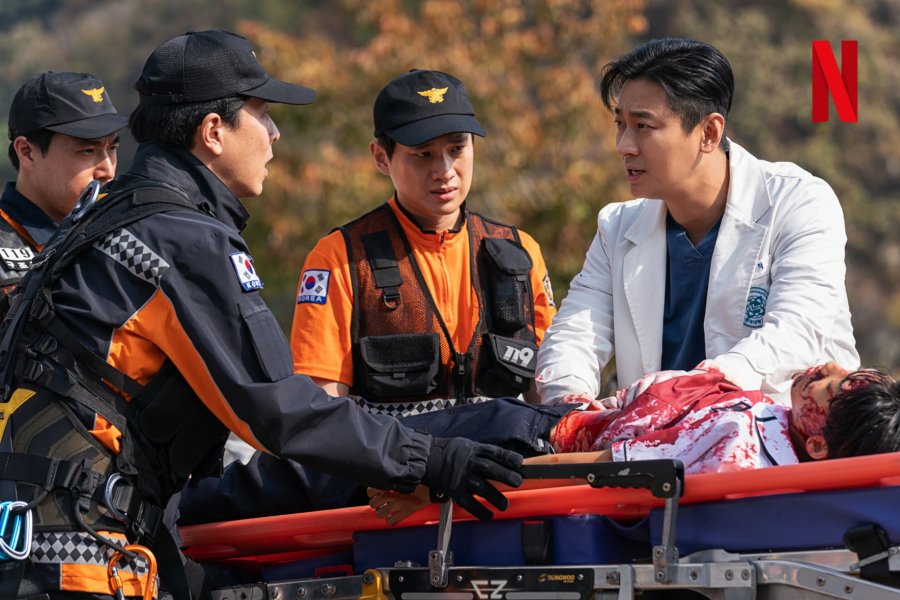
✍️Writing & Pacing: Sharp as a Scalpel
One of the drama’s biggest strengths is its fast-paced storytelling. Each episode presents a new emergency or ethical crisis, allowing no room for filler.
- Dialogue: Sharp, emotionally charged, and often laced with dark humor. Baek’s clashes with hospital execs and colleagues provide some of the show’s most electric exchanges.
- Structure: A smart balance between episodic trauma cases and long-term arcs allows for steady plot escalation and deep character development.
- Realism vs. Drama: While some surgeries stretch believability, the emotional core remains authentic. It’s still a K-drama, so expect a few melodramatic beats—but nothing that undermines its integrity.
Comparisons to House and ER are fair, but The Trauma Code brings its own DNA: battlefield trauma, Korean healthcare politics, and a tone that blends urgency with cultural nuance.
🎥 Visuals & Cinematography: Tension You Can Feel
Visually, The Trauma Code: Heroes on Call doesn’t just meet expectations—it exceeds them. From start to finish, the series delivers cinematic intensity and immersive realism more commonly found in big-screen action thrillers. Every visual element is crafted to heighten tension, pulling viewers directly into the chaos of trauma care.
Realistic hospital sets recreate the claustrophobic pressure of emergency rooms, while meticulously choreographed field rescues—ambulance operations, helicopter extractions, and disaster scenes—inject the show with a pulse-pounding, high-stakes energy.
Key Visual Highlights:
- Handheld camera work in ER scenes adds a documentary-like immediacy
- Dramatic lighting shifts seamlessly between urgency, dread, and emotional stillness
- Outdoor action cinematography rivals military thrillers in scope and precision
- Hyper-realistic trauma makeup and surgical effects strike a balance between detail and restraint
The sound design—monitors beeping, coded calls, breathless silences—adds another layer of tension. With music used sparingly and purposefully, the drama unfolds organically, allowing the performances and visuals to lead. Altogether, these choices make The Trauma Code one of the most visually immersive K-dramas in recent memory.
✅ What Works
- Gripping storytelling – Each episode delivers high-stakes tension, emotional payoff, and meaningful character development.
- Phenomenal performances – Ju Ji-hoon and Chun Woo-hee are magnetic on screen, with compelling chemistry and standout individual arcs.
- High production value – Realistic sets and meticulously shot sequences immerse viewers in the chaos of trauma care.
- Tight pacing – With just eight episodes, the series wastes no time. Every moment counts, with no filler—just fast-moving drama and emotional intensity.
- Ethical depth – This drama goes beyond surgeries. It examines what it truly means to care, lead, and push back against a flawed system.
- Unique tone – The show balances serious medical themes with bursts of humor and bold character moments—nicknames, misunderstandings, and quirky banter that add heart and humanity to the intensity.
❌ What Might Not
- Medical inaccuracies – Some surgical scenes and rescue situations push believability for the sake of drama.
- Occasional melodrama – Some conflicts lean into K-drama exaggeration (hey, it’s still a K-drama).
- Underexplored characters – While Baek and Jae-won shine, supporting characters like Kyung-won and Jang-mi could use more development.
- Baek’s emotional distance – Despite his compelling arc, Baek’s backstory and emotional depth are only partially explored.
👋 Wrapping Up…
The Trauma Code: Heroes on Call isn’t just another medical K-drama—it’s a raw, fast-paced, and emotionally resonant series that cuts through clichés with surgical precision. Fueled by high-stakes emergencies, commanding performances, and a relentless critique of a broken system, it trades soft lighting and hospital gossip for grit, urgency, and moral complexity.
This is not the drama for slow-burn romances or cozy subplots— and that’s exactly why it stands out. Instead, it dares to ask: What does it take to save a life when the system itself is broken? How far should one doctor go when protocol becomes an obstacle?
With standout performances—especially Ju Ji-hoon’s commanding turn as Dr. Baek—and cinematic production quality, The Trauma Code delivers real tension, emotional storytelling, and gripping social commentary.
It’s not trying to be Hospital Playlist or Dr. Romantic. This series puts spectacle and ethics at the forefront—less sentiment, more survival. And it works. While it could benefit from deeper character development beyond the central duo, what The Trauma Code does offer is tight, purposeful storytelling with real bite.
So, if you’re into K-dramas but want something more adrenaline-charged and stripped of filler, this is the one. It won’t warm your heart—but it will absolutely race it.
🔥 Should You Watch It?
If you loved Dr. Romantic, House, or Descendants of the Sun, but wish they had more edge and urgency—this is your next binge. Just be prepared: there’s no soft lighting or coffee shop confessions here—just raw medicine, relentless willpower, and the brutal beauty of saving lives under fire.
Let’s hope Netflix gives us a Season 2, because this trauma team has only just begun.
💬 Have you watched The Trauma Code: Heroes on Call yet?
What did you think of Dr. Baek’s no-hesitation methods and the trauma team’s journey?
Drop your thoughts in the comments or DM me your favorite scenes—I’d love to hear your take!

Trailer
Recommendations
Disclaimer: All images are owned by their respective creators. Used here under fair use for review purposes. Credits to Netflix and associated promotional partners.


